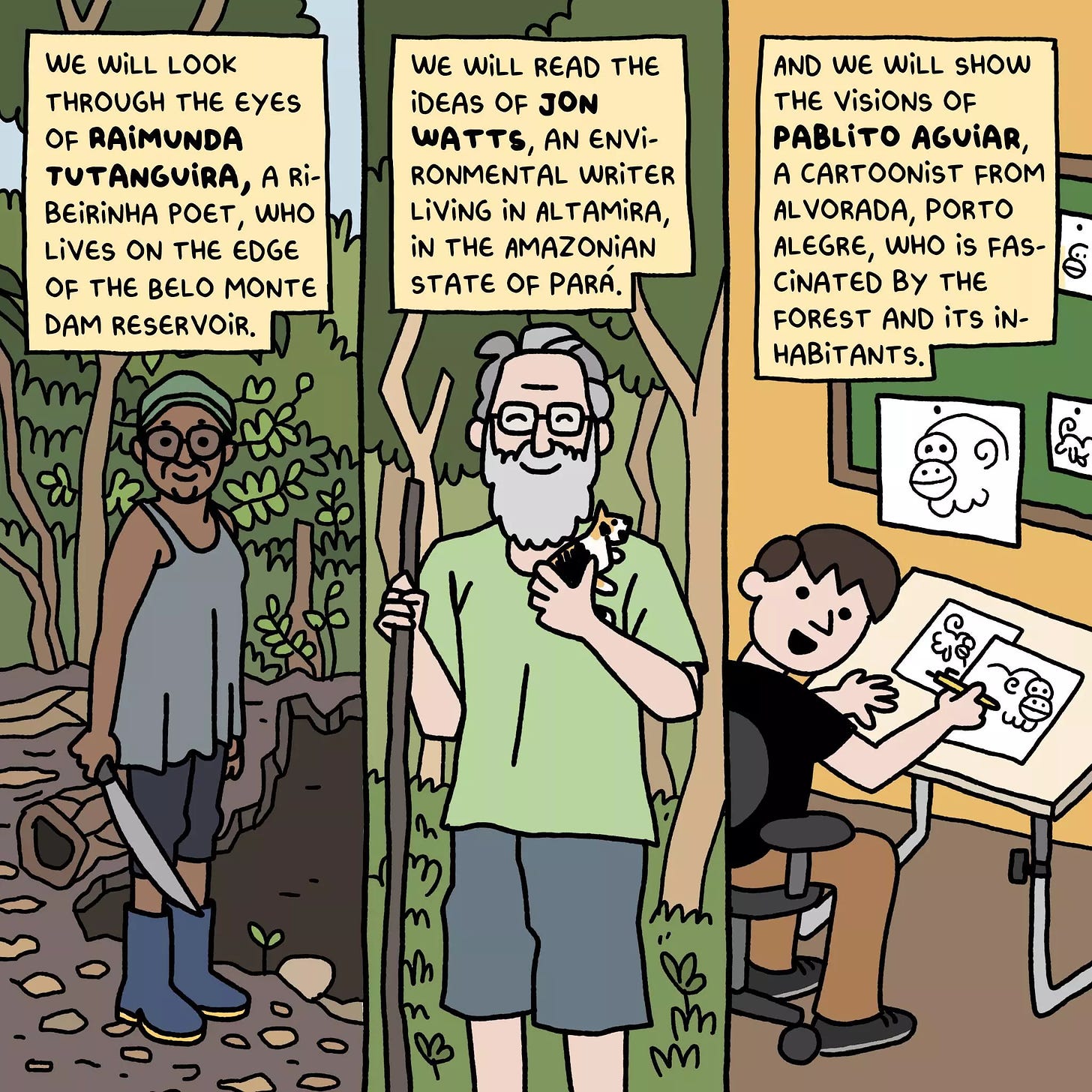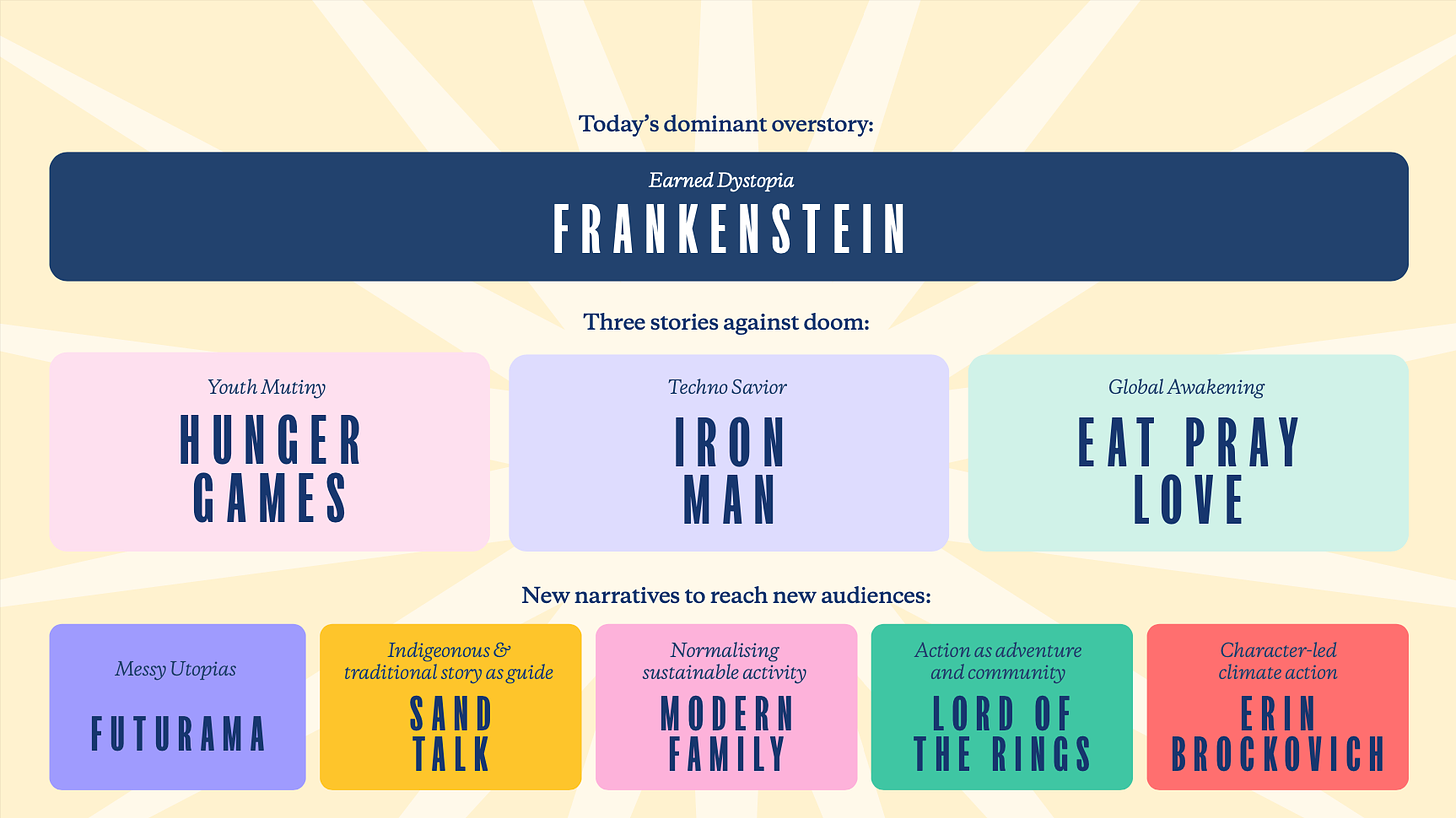🦼✨The Nexialist #0131
perfumed garden | saudi arabia buys the world | climate violence | more-than-human rights | de-zombifying people | thanatosis | climate storytelling toolkit | amsterdam’s green standards | curb-cut
welcome to another week of weaving zeroes, ones, and brainsparks, the nexialist
hello, you! i hope this e-mail finds you alive not pretending to be dead. this week, the synchronicity of the algorithms/content creators brought lots of beautiful/eye-opening contents that i could link to one another more smoothly than usual. i’ll keep this intro short because this time the nexialist is a bit text heavy. enjoy, read, watch and please, keep sharing.
a big hug 🫂
1 year ago » 👴🏻✨The Nexialist #0080 : Retrospective Aging | Old Hollywood Bloopers | Predicting the Past | Funny Business | Ostrich Effect | Missing You | Where Do You Search? | Five Cs Research Routine| Missing You | Bedtime Stories
2 years ago » 👙✨The Nexialist #0030 : 2031: A Future World Report | The State of Sustainability | Beyond Silicon Valley | Does Coolness Still Exist? | Skin Hunger | The Clothing Revolution | Classic Nudes | Nipples Poem | Lazy Eye
🍄the perfumed garden
since last week we had some sex-related horny brainsparks, this link appeared: tips, tricks & takeaways from a 15th century arabic sex manual, by avigail hayoun.
The Perfumed Garden was written as a guide to sexual behavior for the average Muslim man of the 15th century. It includes sexual positions, foreplay descriptions, and techniques for enhancing sexual pleasure. The manual originally had 21 chapters covering topics such as love, marriage, and sexual health, but there was great controversy surrounding the elusive chapter 21 (we’ll get to that later). Considered a classic in Arabic literature, The Perfumed Garden has continued to receive much criticism since the time of its first translation into English by the knighted and self-proclaimed “Orientalist” Sir Richard Burton, due to some of its glaringly problematic views of sex and its promotion of non-consensual sexual behaviour.
as much as it was full of sex-positive content and explored taboos from the Victorian era which are still alive today, it also carried a lot of controversies and tips: from comments on male endowment (what is too small or too big), secretly cheating, and of course, sexist and ageist remakers. then the “plot twist,” Burton’s translation was an exaggeration of the real book.
Burton’s first translation is now known to be a highly exaggerated version of the original Arabic, turning a short manual or treatise of no more than 85 pages into a 1,282 pages book including a 200-page essay on sodomy. […] Burton’s translation of the work has since been proven to be greatly flawed in translation and style, his translation misinterpreted many words and concepts in Nefwazi’s original and Burton fabricated ‘exotic’ details to feed into the Victorian obsession with “Orientalism”.
brainsparks: BDSM Test: What kind of sexual deviant are you? (tn#6), measuring manhood (tn#125), how to have better sex (tn#130), pornhub’s year in review (tn#108), erotic intelligence (tn#1)
🛢️how saudi arabia is buying the world
talking about arabian influence, this link came up in the syllabus: how saudi arabia is buying the world, by quinn slobodian. “as the kingdom’s model of capitalism without democracy thrives, the prospect of a Saudi century has consequences for us all.” it is quite unsettling to see this kind of capitalism spreading its tentacles all over the world while using technology, “sustainability” and “progress” as costumes for further power and global influence.
brainsparks: technowashing (tn#67), sportswashing (tn#96)
☄️the rise of climate violence
also, from the syllabus, i just had to stop and watch this talk by ruth morgan about climate violence. it’s a 20min read that explains the history of this argument. here’s a snippet that stood out for me.
But for the climate Justice movement, climate violence is the violence not from below but from above as Rebecca Solnit put it in a 2014 op-ed: “Climate change is global-scale violence against places and species, as well as against human beings, once we call it by name we can start having a real conversation about our priorities and values.”
🫎more-than-human rights
recently, the laje river in brazil was granted rights, a historical first in the country’s history. and we see this happening slowly around the world. this week the MOTH project crossed my virtual search, and i can’t wait to see more of these.
“The More Than Human Rights (MOTH) Project is an interdisciplinary initiative advancing rights and well-being for humans, non-humans, and the web of life that sustains us all.”
brainsparks: amazonizing the world (tn#124), beyond human-centered design (tn#17), decolonizing our temporality (tn#10), time rebels + how to be a good ancestor (tn#18)
🧟how to de-zombify people
sumaúma is launching two projects to add to their important mission, so i’ll share with you, because it’s perfectly in tune with the other contents of this week.
Today, we are happy to report that we have reached a new phase in our growth as a trilingual journalism platform: this week we are launching two creations to help break the zombilescence – aimed not at panic, but rather at informed action.
One of them is the Jargon Buster, in which reporter Claudio Angelo will explain everything our readers need to know to take part in the debate shaping the climate and how the planet looks – as well as our life on it. […]
Our other new feature is a collective creation by a unique threesome, which could only be brought together by the fight for nature: Pablito, Raimunda Tutanguira, and Jon Watts. They have been meeting for months to collectively develop Howler, a more-than-human who is now embarking on a journey of discoveries through the Amazon, who we hope can be followed – and talked about – by kids, teens and adults, used by teachers in classroom discussions, and shared in libraries. It is fiction based on the best in science and journalism, created to talk about reality to those that want to reconnect to it through love.
brainsparks: amazonizing the world (tn#124)
😵thanatosis
Of all the ways animals have evolved to evade predators, feigning death might be one of the most creative—and risky. Scientifically known as thanatosis, or tonic immobility, playing dead occurs across the animal kingdom, from birds to mammals to fish.
we all saw that video of the squirrel playing dead (and staging its own “death”— which is next level thanatosis.) but i just learned this week there is a word for this “playing dead.” and it made me think: maybe humans are collectively and mentally on a thanatosis stage, faking death in the face of climate collapse. we can do better.
📇climate storytelling toolkit
this was one of the most exciting links this week. futerra released this climate storytelling toolkit. it’s one of those beautiful decks that are a delight to read through. which stories about climate change are we telling today? which could we tell more or less of?
Climate Change is a Story: Our climate destiny won’t be decided in boardrooms, or parliaments, in the financial markets, or even on the streets. It will be decided in the story which we, humanity, tells ourselves, about ourselves.
Why? Because everything else is essentially settled. We know the old structures and systems for a fossil-fuelled over-consumption economy must end. We also know, in detail, the renewable energy systems and sustainable lifestyles required of us. The necessary economics, politics, and even the technologies are increasingly clear. The science has been screamingly obvious for decades.
Today, we’re just missing the right story.
brainsparks: awesome anthropocene goals (tn#76), protopia futures (tn#27), storytelling periodic table (tn#22), lo-tek: a new mythology of technology (tn#43), permacrisis (tn#94)
🇳🇱amsterdam’s green standards
thank you, juan, for this video. it’s inspiring to see these other stories and circular initiatives around the city we live in.
Amsterdam has set for itself the bold goal of becoming the world's first circular city by 2050. […] As part of this plan, Amsterdam aims to halve the use of virgin raw materials by 2030, effectively reducing carbon emissions and increasing sustainability. Over 70 experimental projects have been launched, each focusing on various sectors such as construction, food, and consumer goods.
These initiatives are not without their challenges, but the city is proving that the path to a circular economy, though complex, is not only viable but a necessary step towards a sustainable future.
🦼curb-cut effect
this video from @shaeitaintso popped up in my instagram and i had never heard the curb-cut effect:
“curb-cuts, those miniature ramps on sidewalks, were first built in California in the 1960s to address the needs of wheelchair users. they are now a universal sidewalk feature relied upon by people with strollers, bikes, scooters, carts and more. the curb-cut effect demonstrates that when we make changes to help a marginalized community we as an entire society benefit.
close captioning was created for those with hearing impairments, and is now used by anyone in a noisy environment. text-to-speech is useful for anyone with busy hands. gender neutral bathrooms are a godsend for anyone just seeking privacy. inclusive family and parental leave policies benefit straight couples with unique caregiving situations.
the steps we take to take care of the few positively impact the many.”
thinking of more-than-human rights, i can only see the entire society benefiting. you know who won’t benefit though? whoever is capitalizing on the current system…
read: the curb-cut effect — stanford social innovation review
see you next week, moths 🫀
❓If you want to know what a Nexialist is, click here.
🔎If you want to see what I’ve already posted, visit the archive and use the search engine. Even I do that a lot.
💌I want to know what you think/who you are! Your feedback is highly appreciated; you can e-mail me or fill in this short survey. Thank you! 🙏🏻
🔌Let’s Collab?
I truly believe innovation comes from bringing improbable areas together, and that’s why I called this project The Nexialist. Some sectors are known to be self-referencing and hermetic. Sometimes teams are on autopilot mode, focused on the daily grind, which hinders innovation. As a Nexialist, I like to burst these bubbles, bringing references from different areas, and maintaining teams inspired and connected to the Zeitgeist.
I offer inspiration sessions called Brainsparks, creative desk research (Zeitgeist Boost), Plug’n’Play deals for workshops and sprints, and other bespoke formats. If you want to know more about this, send me an e-mail with your challenge(s) and we can figure something out together. Check out my website and some work I’ve done below:









